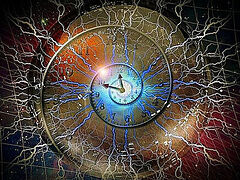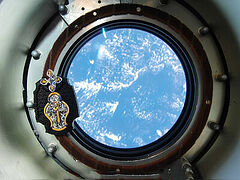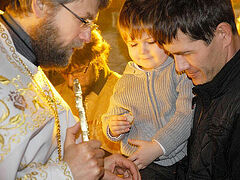The most important miracle of Christianity is the Resurrection of Christ, but no less miraculous are His Incarnation and work of redemption. Thus, all Christianity is based on miracles.
Of course, not every unexplained phenomenon should be immediately regarded as miraculous. In general, the pursuit or constant expectation of miracles is very destructive for the faith. A miracle should not become an end in itself. We should remember that the Lord is not a magician, and, therefore, if He performs a miracle it is always for a specific purpose and under certain special circumstances. The most important miracle has already taken place. But anyway, we can say that Christianity is a religion of miracles. That is why one of the assaults of modern skepticism is directed against the reality of miracles. I would like to say a few words about the possibility of a miracle as such from the point of view of common sense.
With the described formulation of the question, a skeptic or an atheist will immediately declare with indignation that belief in miracles is incompatible with common sense. Well, that’s the way it is, but only in his rather narrow, materialistic, scientific world—where there is a lot of information but little breadth of thought. When a person who believes only in nature encounters some unusual or inexplicable phenomenon, he is sure to argue that his observation was incorrect or incomplete, that it will be possible to explain it in the future, or that there is some statistical probability, albeit infinitesimal. Someone may smile at this suggestion, but I would not advise anyone, as it usually happens, to trivialize everything and start shouting that religion slows down scientific progress—so to speak, “If you think that way, then everything can be attributed to God’s will.” It is better to leave this popular primitive judgment for internet memes, but not for any serious reflections. In any case, we should take into account the fact that if we exclude God, then in making attempts to explain a miraculous phenomenon, we ignore one of the possible explanations.
A materialist perceives the universe as a closed system in which nothing can interfere from the outside, but at the same time he seems to forget about the limitations of his own feelings and cognitive capacity. For a proponent of scientism and skeptic, science becomes a self-sufficient value—it exists as if separately from the people who created it and are creating it, as a kind of “Holy Grail”—the sole and independent source of truth. But how can the source of something for mankind be a derivative of human labor? It would be the same as saying that the heat and light emitted by the sun are its sources of heat and light. I’m by no means saying that science is not objective; but I repeat: It is a field of knowledge created by limited human beings. Those who believe in God, or at least accept metaphysics and value humanitarian knowledge, do not reject mankind’s cumulative religious experience as unequivocally false; they regard the universe as an open system, and therefore admit the possibility of outside interference in it—and therefore miracles are possible.
No matter how intelligent and well-educated a person may be, no matter what worldview he has, there is hardly anyone who dares assert that he has gotten to know everything that exists, and therefore, “there is certainly no spiritual realm”. But exploring the natural world around us, we have the opportunity to observe and experience only a tiny part of Creation. So, if we know so little about what we can touch or bring into a laboratory, then voluntarily limiting ourselves to only material cognitive capacities, how can we objectively speak about non-material things?
C.S. Lewis’s idea is also very important here. Let’s think about the fact that all scientific knowledge is based on “old” experience. Broadly speaking—an experiment is conducted, the results are recorded, and conclusions are drawn. If the results of the experiment repeat themselves, then we can predict some events for the future. But God’s intervention in the usual course of the laws of the universe is not only an extraordinary event—it is always “new”, and therefore science with its methods of cognition of the “old” is powerless in this case.
As C.S. Lewis said, the basis for faith and unbelief is always the same, because much depends on your inner worldview. Observation of nature around us cannot provide total proof of the existence of God, but it still contains indirect indications of it. Take the famous “Watch and Watchmaker” argument by William Paley. We can conduct various experiments with a watch, but the resulting physical data will not tell us anything about the watchmaker who created it. But if we start thinking more broadly, move away from dull numbers and formulas and try to look not at the individual metric parameters of hands and gears, but at the mechanism as a whole, where not only is each part dependent on the other, but everything together serves a specific purpose, we will understand that the clockwork was created by an intelligent watchmaker. Similarly, God is unknowable by scientific method, but this does not mean that He is unknowable in principle. If there is a “Watchmaker” of this world, doesn’t He have the right to interfere in the work of the “watch” when there are good reasons to do so? For the inhabitants of the “watch”, who are accustomed to obeying certain laws, such an intervention will seem miraculous. God as the Creator of laws is not obliged to obey them, and by violating them He does nothing wrong.
Criticizing the reality of miracles, the Scottish philosopher David Hume (1711–1776) refers to the uniformity of nature. He argues that if a miracle is a rare phenomenon, and the law of nature is an event that occurs regularly, then the arguments in favor of the frequent here clearly prevail over the arguments in favor of the rare. However, if we accept such a seemingly reasonable premise, then the whole “building” of modern evolution and physical cosmogony will collapse, because the statistical probability of the universe that we live in coming into existence and the life spontaneously arising are so negligibly small that in laboratory conditions, instead of 500 zeros after the decimal point scientists would write just zero. However, for a proponent of scientism, that number is sufficient, if only they might avoid believing in God.
It is also worth noting that Hume equates probability to authenticity. If the Resurrection of Christ is an unlikely event, but there were many witnesses to it, then it does not mean that it is inauthentic. By and large, almost all of our knowledge is built on trust. For example, I have never been to Antarctica, but I know for certain that it exists, because I trust the testimonies of people who have been there. Likewise, no living person has ever personally met Alexander the Great, but we believe the chronicles that described his life. If we were as distrustful of all fields of knowledge as we are of religion, then there would be no science. Skeptics keep saying that we must only trust facts, but when it comes to miracles, they immediately appeal to statistics, claiming that if people are not resurrected nowadays, then neither was Christ risen from the dead.
Thus, the reality of miracles, as well as the reality of God, are not as obvious as, say, the law of gravity; but equating them is categorically erroneous. Everything depends on a given person’s a priori worldview. However, if we dig deeper, then faith in the Creator of the universe, Who is capable of intervening in the usual course of life for us, is much more reasonable than faith in the “omnipotence” of science and the cognitive capability of the human mind.





